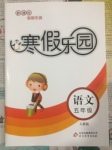题目内容
Britain_________________(议定) a trade agreement with China.

 寒假乐园北京教育出版社系列答案
寒假乐园北京教育出版社系列答案
People celebrate birthdays in almost every country on earth. And they celebrate them in many different ways.
In China and in Japan, for example, the arrival of New Year is more important than a person’s birthday. So everyone adds a year to celebrate their ages on New Year’s Day, instead of on their birthdays,
In Brazil, the special birthday food isn’t cake, but special candles. In China, it’s long noodles—for long life. In Iceland, people have pancakes with candies rolled inside them on birthdays.
In Britain, a birthday is an all-day celebration. At school, the birthday child is lifted up and “bumped” by his classmates. This means the child is lifted by the feet and arms and bumped to the ground, once for each year once for good growth. In Israel, the same custom is followed, except the birthday person is lifted and lowered while sitting in a chair.
In Holland, children not only get presents, but also give things out. They give cakes, cookies and candles to their classmates and teachers on their birthdays.
In Mexico, it’s good luck to give birthday greetings as early in the day as possible. So it’s usual for the birthday child to be woken up at midnight by fiends singing birthday songs.
In India, birthday celebrations also begin before dawn. Prayers and blessings must be said before morning comes.
In Thailand, two tall candles are lighted the night before the birthday. One is as tall as the birthday person. If it goes out early, it’s bad luck. Another customs of Thailand is that they buy live fish and birds for the birthday person and then the birthday person frees the animals, and it brings good luck.
In Nigeria, people in a certain age group celebrate their birthdays together, on a certain day.
In many countries birthday customs are changing. Old customs are giving way to western style of birthdays, with candle topped cakes. But one thing never changes—birthdays are special days for everyone!
【小题1】It’s a custom to lift and lower the birthday person in a chair in _____.
| A.Britain | B.Israel |
| C.Britain and Israel | D.Israel and Thailand |
| A.In Thailand people give fish and birds to the birthday person as presents. |
| B.In Holland people give presents to unbirthday persons on their birthdays. |
| C.In Nigeria people who were born in the same period may celebrate their birthdays on the same day. |
| D.In Thailand a candle will be lighted on the birthday night. |
| A.Different countries have different birthdays. |
| B.Celebrating birthdays is exciting. |
| C.Different ways of celebrating the birthday in different countries. |
| D.Everyone likes celebrating his or her birthday. |
In recent years, especially during the l960s, there was much discussion about “the brain drain (排干, 流失),” which dealt with the problem of students and learned people who left their own countries for other countries that offered better chances for study, research, and employment.For example, according to a report from U.N., between 1962 and l966 more than 50 percent of all engineering graduates of Iran and 14 percent of Iranian scientists left their country for work abroad.Over 30 percent of Chilean engineers and 15 percent of Turkish physicians also went to work in other countries.Probably the greatest brain drain occurred among young scientists who had gone abroad to study.Many of them had planned to return to their countries to teach but chose to remain in more industrialized nations where they were able to continue their work and their research in fields in which there were no job possibilities at home.The countries that attracted most of these scientists were the United States, Great Britain, Germany, France, Canada, and Australia.
Recent studies show that the brain drain to the United States may be decreasing.Many foreign scientists are going home again, and in some cases American scientists are leaving the United States for employment in other countries.The main reasons are that good jobs are becoming fewer here, money for national research has been sharply cut, and university fellowships reduced too.However, in the field of medicine the drain to the United States still goes on.Today more than one of every five American doctors is foreign - born, and several thousand foreign doctors immigrate to the United States each year.Over eighty countries have asked the State Department to send students who are skilled in important fields such as medicine back home when their study programs are over.
【小题1】Which of the following is not the reason for “the brain drain”?
| A.Good housing. | B.Better research condition. |
| C.Good job possibility | D.Better chances of study.. |
| A.many foreign scientists are ordered to return to their motherlands |
| B.they don’t need any foreign scientists now |
| C.there are fewer and fewer good jobs in the USA |
| D.the universities refuse to provide money for the foreign scientists |
A.About half of them. B More than 20 percent
C.Several thousand. D.About 15 percent.
【小题4】Which is the best title for this passage?
A.How to seek a job in the USA. B.Doctors’ immigration to the USA.
C.A strange case. D.The brain drain.
 at cheating on this scale would not happen again.
at cheating on this scale would not happen again.